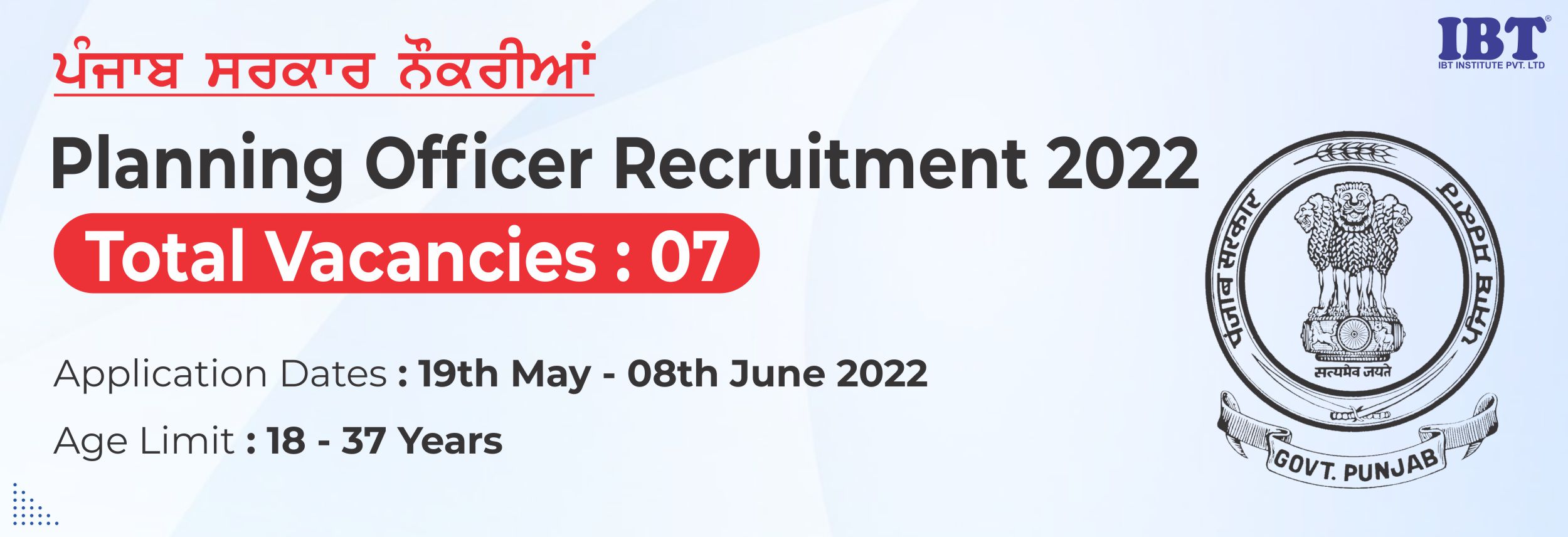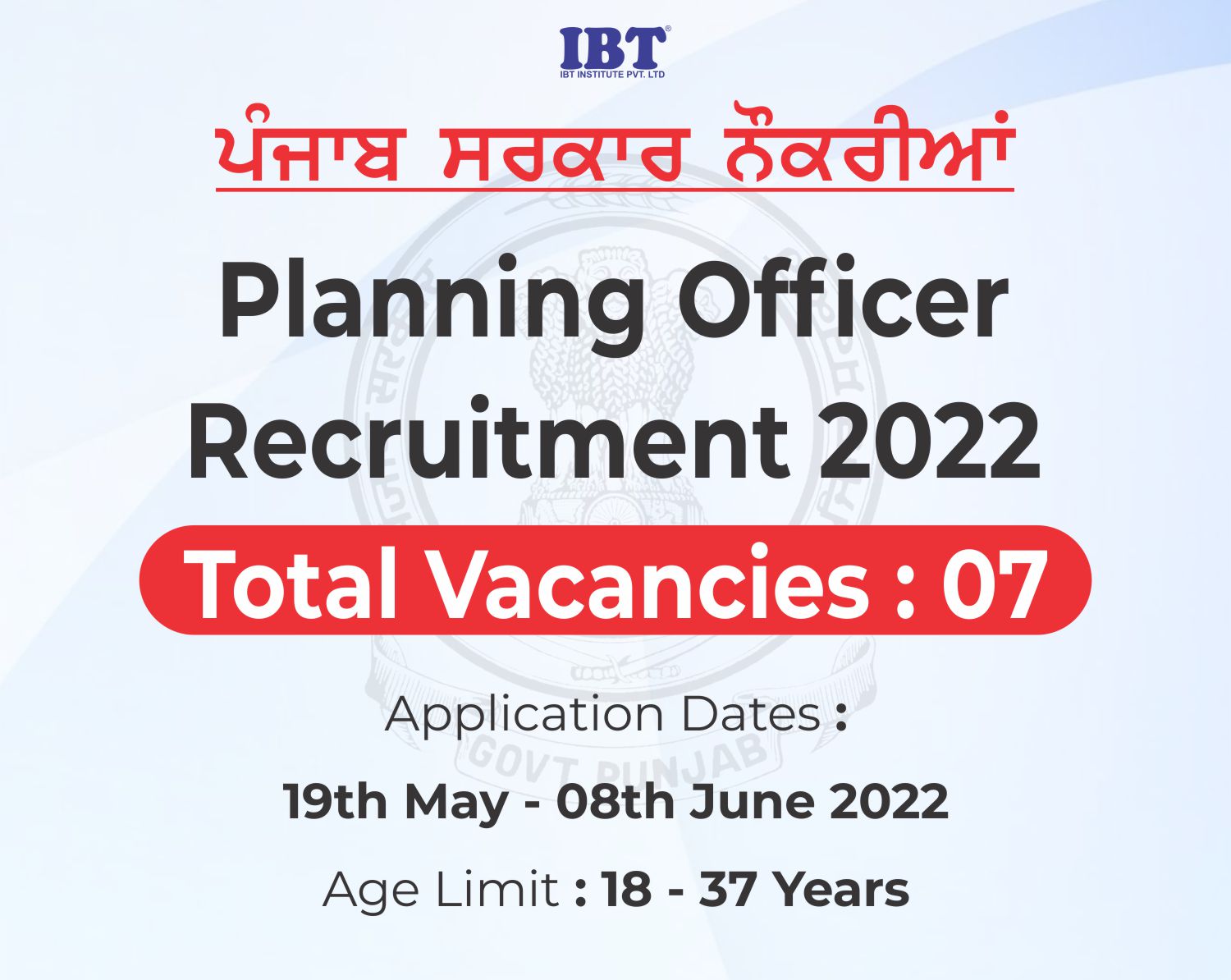PPSC Planning Officer Recruitment 2022
Punjab Public Service Commission has released an official notification for the recruitment process for the post of Planning Officer. Total 7 vacancies have been announced by PPSC. Candidates can apply for the post of PPSC Planning Officer (Group-A ) from 19 May 2022 to 08 June 2022 till 11:59 pm.
Here are some important exam highlights for the post of the PPSC Planning Officer (Group-A):
|
Punjab Police Service Commission(PPSC) |
|
|
Post Name |
Planning Officer(Group-A) |
|
Category |
Recruitment |
|
Total Vacancies Available |
07 |
|
Job Application Mode |
Online |
|
Online Application Start Date |
19th May 2022 |
|
Online Application End Date |
08th June 2022 |
|
Job Location |
Punjab |
|
Official Website |
ppsc.gov.in |
Vacancy Details
PPSC has declared to conduct the recruitment process of a total 7 posts of the Planning Officer(Group-A). From the total number of vacancies, 2 are reserved for women.
|
Post |
Total vacancies |
Vacancies for women |
|
Planning Officer(Group-A) |
7 |
2 |
Reservation Of The Posts
The different number of vacancies are announced for candidates belonging to different categories. Here are vacancy details of individual categories:
|
Category |
Total no. of posts |
Posts reserved for women out of the total no. of posts |
|
General |
01 |
00 |
|
Ex-Servicemen/LDSEM |
02 |
00 |
|
Freedom Fighter, Punjab |
01 |
01 |
|
Sports Person, Punjab |
01 |
00 |
|
Person with disability, Locomotive disability |
01 |
00 |
|
Backward classes, Punjab |
01 |
01 |
|
Total |
07 |
02 |
Important Dates
The important dates to apply for the post of Planning Officer(Group-A) and the last date of fee submission are mentioned in the underneath table:
|
Activity |
Dates |
|
Starting date of Online Application |
19 May 2022 |
|
Last date of Online Application |
08 June 2022(11:59pm) |
|
Last date of Fee payment |
18 June 2022 |
Eligibility Criteria
Candidates willing to apply for the post of Planning Officer(Group-A) must fulfill the following eligibility criteria:
-
Bachelor’s degree in Town and Country Planning or Bachelor’s degree in Architecture from a recognized institute or university.
-
Candidates must have passed matriculation with Punjabi as one of the compulsory or elective subjects.
-
Candidates should not be below 18 years and above 37 years.
Application Fee
Candidates from different categories need to pay the online application fee as per the details given in the below-mentioned table:
|
Category |
Online Application charges |
Examination fee |
Total |
|
Scheduled castes/Scheduled tribes of all states and Backward classes of Punjab state only |
Rs. 500/- |
Rs. 250/- |
Rs. 750/- |
|
Ex-servicemen of Punjab state only |
Rs. 500/- |
No Fee to be paid |
Rs. 500/- |
|
Economically weaker section (EWS), Persons with Disabilities(PWD) and Lineal Descendants of Ex-servicemen(LDESM) Punjab |
Rs. 500/- |
No Fee to be paid |
Rs. 500/- |
|
All other categories i.e General, Sports Persons of Punjab and Wards of Freedom Fighter, Punjab |
Rs. 500/- |
Rs. 1000/- |
Rs. 1500/- |
Selection Procedure
Candidates preparing for the PPSC Planning Officer(Group-A) exam must know the selection procedure. The selection criteria for the post of Planning Officer(Group-A) is given below:
|
Subject |
Number of Questions |
Total Marks |
|
Written Competitive Examination |
120 |
480 |
|
Interview |
- |
60 |
|
Total Marks |
- |
540 |
PPSC Planning Officer(Group-A) Exam Pattern 2022
The written exam for the post of Planning Officer will be conducted in offline mode and 120 objective type questions will be asked from two parts of the syllabus(Part A and Part B). The exam pattern for the written competitive exam for the post of Planning Officer(Group-A) is given in the underneath table:
|
Topic |
No. of Questions |
Marks (Each Question carries 4 marks) Type of Questions |
|
Questions from the Subject (Part A of the Syllabus) |
100 |
400 |
|
Questions from General Knowledge, Logical Reasoning and Mental ability (Part B of the Syllabus) |
20 |
80 |
|
Total marks |
120 |
480 |
PPSC Planning Officer(Group-A) Syllabus 2022
The exam syllabus of individual parts for the post of PPSC Planning Officer(Group-A) is mentioned below:
|
PPSC Planning Officer(Group-A) Part A Syllabus 2022 |
|
|
Subject |
Topics |
|
Architecture and Design |
Anthropometrics, Site planning, Circulation- horizontal and vertical, Space Standards, Building Codes, National Building Code, Architectural styles and examples of different periods of Indian and Western History of Architecture, Recent trends in Contemporary Architecture; Works of renowned national and international architects. |
|
Building Materials, Technology, Construction and Management |
Properties, constituents of different building materials viz. mud, timber, bamboo, brick, concrete, steel, glass, FRP, AAC, different polymers, composites, Building construction techniques, methods and details, Building systems and prefabrication of building elements, Estimation, Specifications, Valuation, Professional practice, Construction planning and equipment, Project management techniques e.g. PERT, CPM etc. |
|
Structural Design |
Principles of strength of materials, Structural elements in RCC & Steel, Structural systems in RCC and Steel, Principles and design of disaster resistant structures. |
|
Climate and Landscape Design |
Ecological principles, Concepts of Environmental Impact Analysis, Thermal comfort, ventilation and air movement, Climate responsive design, Architectural acoustics, Green Buildings - Rating; ECBC, Environmental pollution- types, causes, controls and abatement strategies. |
|
Urban Design |
Concepts and theories of urban design, Urban design interventions for sustainable development and transportation, Historical and modern examples of urban design, Elements of urban built environment – urban form, spaces, structure, pattern, fabric, texture, grain etc, Principles, tools and techniques of urban design, Urban renewal and conservation, Development controls – FAR, densities and building byelaws. |
|
Building Services |
Building Services: Water supply, Sewerage and drainage systems, Sanitary fittings and fixtures, Plumbing systems, Principles of lighting and illumination, Elevators and Escalators, Air-Conditioning systems, Fire fighting Systems, Building Safety and Security systems. |
|
Planning Theory and History |
Evolution of Settlements, Study of Evolution, Human settlements as an expression of civilization, Basic elements of the city, concepts of space, time, scale of cities, Town Planning in ancient India medieval, renaissance, industrial and postindustrial cities, Contribution of individuals to city planning, Lewis Mumford, Patrick Geddes, Peter Hall, Le Corbusier, Tony Garnier, Ebenezer Howard, Definitions of town and country planning, Orthodoxies of Planning, sustainability and rationality in planning, components of sustainable urban and regional development, Theories of urbanization including Concentric Zone Theory, Sector Theory, Multiple Nuclei Theory and other latest theories, Emerging Concepts: Global City, inclusive city, Safe city etc. City of the future, future of the city; shadow cities, divided cities; Models of planning: Advocacy and Pluralism in Planning; Systems approach to planning: rationalistic and incremental approaches, mixed scanning and middle range planning, advocacy planning and action planning, equity planning |
|
Planning Techniques |
Physical surveys and Socio-economic surveys, Survey techniques, etc, Land use classification/coding, Techniques of preparing base maps, regional, city, zone, local area plans, UDPFI guidelines, zoning regulations and development controls. |
|
Transport Planning |
Role of transport, types of transport systems, problems and mobility issues, Urban form and Transport patterns, land use, Hierarchy, capacity and geometric design elements of roads and intersections, Basic principles of Transport infrastructure design, Traffic and transportation surveys and studies, traffic characteristics, Urban transport planning process-stages, Mobility planning, Transport, environment and safety issues,Traffic Management. |
|
Housing and Community Planning |
Housing as social security, safety, crime and insecurity, deprivation and social vulnerability, gender issues, housing and the elderly, Understanding housing as an important land use component of city plan/master plan, considerations for carrying out city level housing studies, projections, land use provisions, Suitability of land for housing stress identification, projecting housing requirements, calculating housing shortages, housing allocation, Approaches to neighborhood living in traditional and contemporary societies, elements of neighborhood structure, Planning and design criteria for modern neighborhoods, norms and criteria for area distribution, Housing and area planning standards net residential density and gross residential density, development controls and building byelaws, UDPFI guidelines, NBC provisions, Emerging concepts of cities - Eco-City, Smart City, Transit Oriented Development (TOD), SEZ, SRZ etc. |
|
Environmental Planning |
UN/International Conferences/Conventions, Environmental Concerns of human settlements, Environmental surveys-Methods of data collection, interview techniques, analysis, Techniques of resource protection and conservation, Resources type, scale, inventory, Topographic analysis, Water quality, Air and Noise, Biodiversity, Methods of addressing environmental quality, Environmental Impact Assessment |
|
Planning process |
Master Plan, Development plan, structure plans, local plans, district plans, sector plans, local area plans, and regional plans, Social research techniques: social survey land use survey, physical survey, building use, density, age of building, application aerial/remote sensing/GIS, National policies affecting urban settlement planning |
|
Socio-economic Planning |
Nature and scope of sociology- concepts and methods, Man & environment- community and settlements, urban sociology-tradition and modernity, Social problems of slums and housing, Social and spatial structure, Basics of economics - economic and human settlements concepts of economic and economic growth-demand and supply-production economic-markets, Population studies – demography, Methods of population forecasts and projections. |
|
Planning for Infrastructure |
Planning of urban network and services, Infrastructure systems, Resource analysis, Issues related to centralized city water supply and decentralized systems, Waste generation, Waste water disposal system including storm water drainage system, Solid waste disposal and management, Planning for fire protection |
|
Legal issues and Professional practice |
Concepts, sources, terminologies, significance of law and its relationship to Urban Planning; Indian Constitution: concept and contents; 73rd and 74th Constitution Amendment Act, Evolution; An overview of legal tools connected with Urban Planning and Development, Land Acquisition Act, Punjab Regional and Town Planning and Development Act, Procedures for preparation and implementation of Regional Plans, Master Plans and Town Planning Schemes, Aims and objectives of professional Institutes, sister bodies, professional role and responsibility of planning consultants, professional ethics, code of conduct and scale of professional charges. |
|
PPSC Planning Officer(Group-A) Part B Syllabus 2022 |
|
|
Subject |
Topics |
|
General Knowledge |
Current Events of State, National and International Importance, Personalities in News, Games, Sports and Multimedia, Science & Technology and Environmental issues, Indian Polity, History, Economy and Geography, History of Punjab-14th Century onwards, India History and National Movement, Indian Art, Literature andCulture, Information and Computer Technology (ICT) — (a) ICT: Advantages, disadvantages and uses. (b) Basic of Internet and Its applications. (c) Developments in Educational Technology. |
|
Logical Reasoning and Mental Ability |
Logical reasoning, analytical and mental ability, Basic numerical skills; numbers, magnitudes, percentages, numerical relation appreciation, Data analysis; Graphic presentations, charts, tables, spreadsheets. |
Initial Pay Scale
The initial pay scale for the post of Planning Officer(Group-A) is 47,600.
How To Apply
Step 1: Candidates aiming to apply for the post of Planning Officer(Group-A) Exam can visit the official website of the Punjab Public Service Commission i.e. ppsc.gov.in.
Step 2: Click on the application link, fill up the form with all the required details.
Step 3: Submit the scanned copy of the required documents.
Step 4: Pay the online application fees.
Step 5: Once done, make sure to take the printout of your application form.

 9696960029
9696960029 Download App's
Download App's



